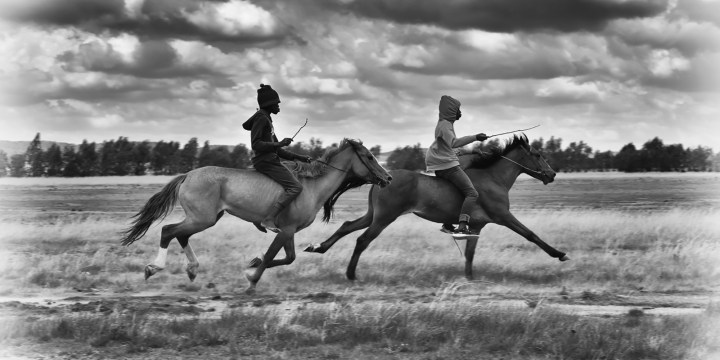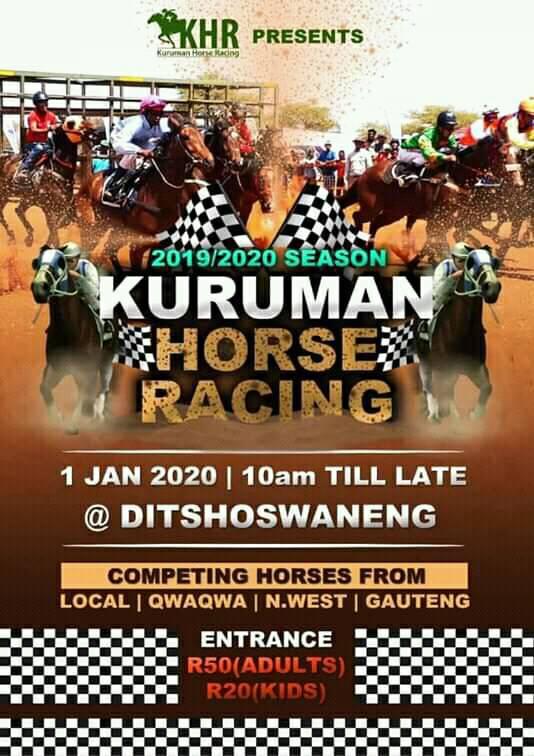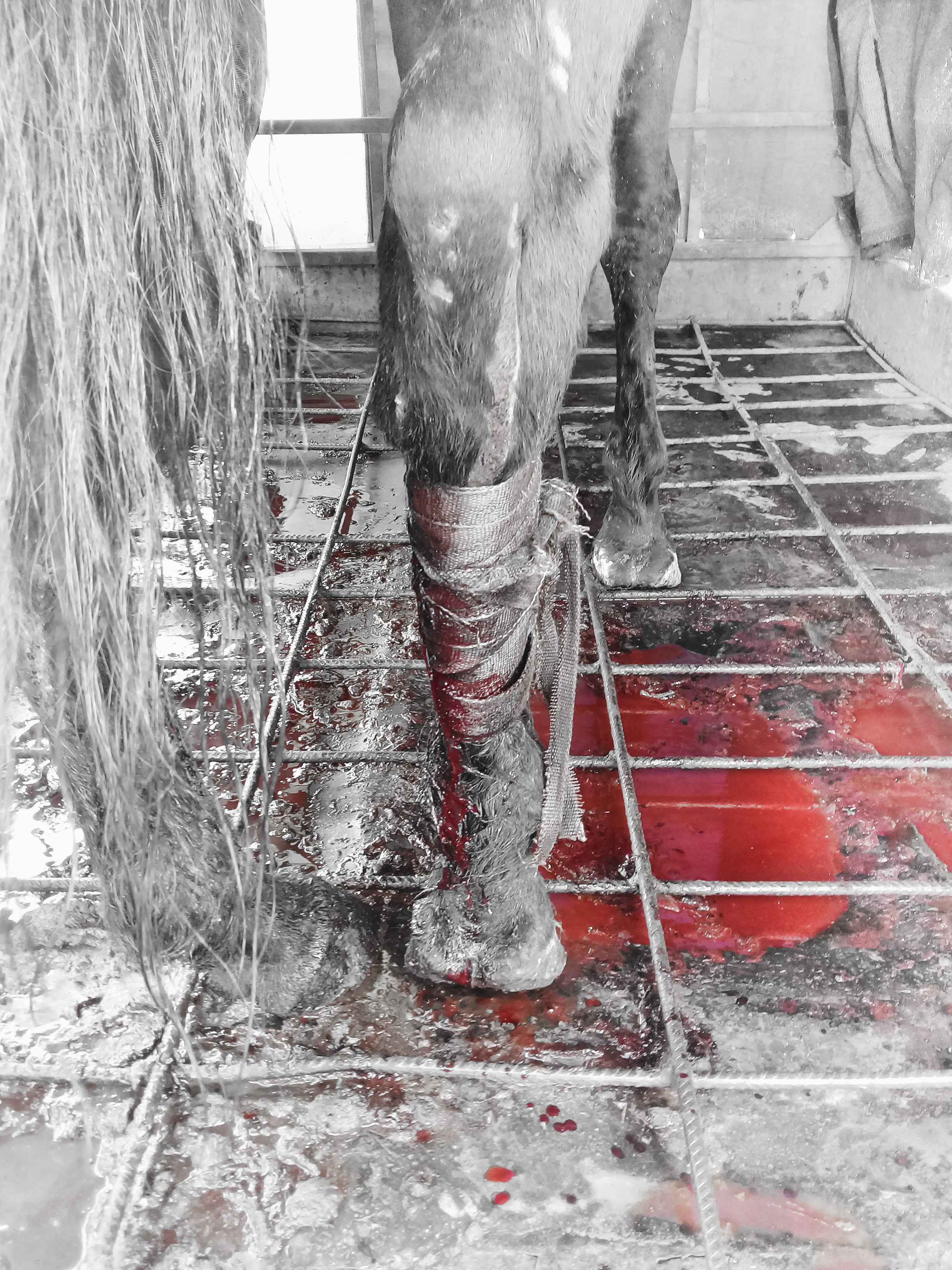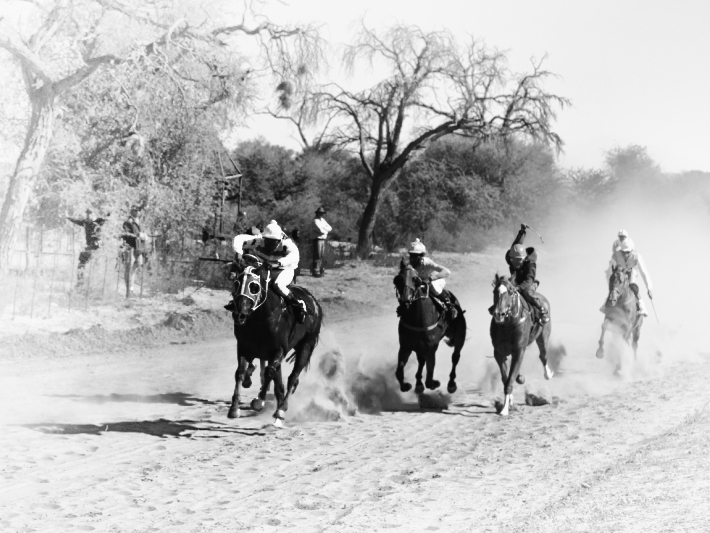HORSE RACING (PART 3)
The grim end of the line for ‘reject’ Thoroughbreds

Thoroughbreds often end their racing career in eventing or leisure riding. But, far from the comfortable stables they grew up in, many are being hammered on dirt tracks and sometimes ridden near to death.
Across the country every weekend, horses of various types – from retired Thoroughbreds to draft animals – thunder over rough fields, down dirt roads and even on tar at the edge of dreary townships as crowds yell and stamp encouragement.
Snooty trainers and breeders call it bush racing, but that entirely misses the point. The people have wrenched the sport of kings from under their noses and claimed it as traditional. In comparison, formal Thoroughbred racing with perfect, hugely expensive horses competing on grass tracks, is a sideshow.
Traditional racing is largely unregulated, with all the attendant problems. At one end are wealthy owners who lavish time, care and money on their animals, and rural people for whom owning and caring for a horse is a status symbol. At the other end is immense cruelty with horses raced, quite literally, to death. There’s also been a gradual expansion from skilled triple racing to full-gallop flat racing, mainly in the Eastern Cape and increasingly with retired Thoroughbreds.
The more formal events like the Dundee July, Bray July, Berlin Race, Klimon Cup, Nkandla Cup are fairly well organised but some are run on tussocky, stony tracks which can be treacherous if it has rained. Stakeholders include local governments, provincial sport and recreation departments, local businesses and pro-racing animal welfare organisations, local gaming boards and even Vodacom.
Everyone involved insists that no betting takes place, but that’s hard to believe. It just flies below the radar of Gaming Board regulations. People will tell you there’s huge money involved but never want to be quoted.
Less formal racing was originally developed by communities using their working animals for entertainment. Prizes consisted of blankets and food hampers and did not involve money. That still happens in some areas.
They focus on individuals and winning and money. We’re in the sport of horse racing, not in the business of horse racing.
In the beginning, races were on any convenient flat surface, with the horses running in a manner that does not mirror the type of galloping seen today with Thoroughbreds. Every weekend hundreds of such races take place across the country.
According to Mahlubi Puzi, a racing administrator in the Eastern Cape, events take place every Saturday with both Thoroughbreds and traditional horses. “They’re part of the fabric, the culture of rural society. Part of a bride’s price might be a saddled horse. Horse racing among local people in colonial times around British garrisons where horses were common.”
“The Mpondomisa people along the Wild Coast like tripling. It’s all about the skill of the rider and the horse. A good horse earns the owner a good name. Further inland from Umtata northwards and the former Ciskei, it’s flat racing.”
He said the Thoroughbreds came from the formal sector. “We give them a second and third chance, a new life. We approach trainers or owners in the formal sector and try to source horses that are getting off the track.
He denied that betting took place, saying it only happened among individuals. He said betting happened in urban areas, in affluent areas like Joburg or Cape Town where high bets are put on horses. “They focus on individuals and winning and money. We’re in the sport of horse racing, not in the business of horse racing.”

Traditional horse racing is huge and betting brisk, but largely flies below the radar unless you’re in the know. (Photo: Don Pinnock)
Stanley Adam of the Eastern Cape Horse Care Unit doesn’t buy that. “Betting might be informal but there’s big-ticket sales. They must pull in huge amounts, but the race prizes are maybe R300,000 in total. So, where is the rest of the money going? It doesn’t benefit the horses or disadvantaged communities. Actually I think betting is making millions. Mr Puzi is a bookie.”
Adam has been attending dirt track races for the past six years. “When I started there was no welfare and conditions were shocking. The condition of the horses was not good. People didn’t know how to feed and take care of horses. They were racing on gravel roads and each time at the end of the race there would be problems. They’d run the hooves off. I had to educate people.
“The big problem is Thoroughbreds. They’re coming in with lawyers, doctors, retired people from cities. They know nothing about Thoroughbreds. This is not the area for them. You can’t put them in a rural area and expect them to blossom. I say to these guys, ‘you can’t take your Ferrari and, like, drive on the gravel road. It doesn’t work like that.’
“Also, people working on the mines are getting them from rich owners in the cities. They don’t want their horses to be checked by vets. Some have problems so their owners sell them. When some of these horses are run over long distances [in rural races] their lungs can’t take it and they bleed through their noses.”

Without proper controls and ridden on fields, stony ground, dirt roads or even tar, terrible injuries can occur. (Photo: Don Pinnock)
Unregulated racing
Here are some examples. In December 2021, the NSPCA issued a press statement about a race it attended in the Eastern Cape. More than 100 horses were inspected and most were found to be Thoroughbreds.
“The use of Thoroughbreds in this unregulated event suggests that the horses, once loved by wealthy owners, would have been auctioned off (at a fraction of the price they were initially bought for) when the horse could no longer perform on regulated horse tracks, such as the Durban July, due to injury, disease or age. These poor animals are then thrown into the world of bush racing.”
The horses in that race would have come from stables where they received specific diets, physiotherapy, specialist veterinary attention. It was held during the rainy season and the track was extremely slippery, muddy and dangerous for the horses and their riders. At the race, the NSPCA found no comfortable stables, no fancy equipment for comfort, no specially formulated diet plans and no drug testing.
“These horses, who were once treated better than most of us human beings,” said the press release, “were now discarded like old shoes at a jumble sale. As this race was unregulated, these participants could not be called to a review board for discipline.
“The lack of compassion displayed by many of the owners for the event was appalling. To attempt to race compromised animals for financial gain, with no regard for the animal’s suffering, is beyond inhumane.”

Each weekend in rural Eastern Cape, horse racing draws large crows. Many Thoroughbreds end up there. (Photo: Eastern Cape Horse Care Unit)
A report in the South Coast Herald documented an NSPCA visit to a rural race in the area in 2020. Wire was being used in place of bits and bridles, causing mouth sores, with horses struggling to eat. Unfitted saddles had caused massive saddle sores and the owners showed no mercy when a horse was injured. Two of the horses had to be euthanised on the spot because of their injuries.
“One of the horses had a hoof which was badly injured and almost detached from the foreleg. Its front leg was swollen with a massive infection, with pus pouring from it. The animal was unable to walk,” said inspector Werneer Taljaard.
The following Saturday, local SPCA chairperson Scott Kvalsig returned to the scene and found two more horses with horrific saddle sores and other injuries. “We saw only desperation in these horses’ eyes,” he said. “They just lay on the ground like they’d given up on living.”
Kendre Allies used to have a horse-drawn wagon collecting scrap in the suburbs of Cape Town. Now he cares for horses at his Oude Molen stables in Pinelands. His passion is taking in horses that have been damaged by use or are facing euthanisation.
“People buy horses but they don’t have the money to care for them. I get horses that are lame from wrong-shoeing. Their owners don’t know how to trim the hooves and think the tar road will file them down. It causes dwaal feet – the hoof curls up and the consequences are severe. It’s neglect.”
But he’s critical of the SPCA and says its intention is all wrong. “A horse may be in good condition and well fed, but it’s in a backyard so the inspectors feel they have a right to take the horse. If they can’t rehome it in six weeks or so, they euthanise it, even if it’s a good horse. People don’t have the money to get their horse back.
“It’s really theft. Local people feel they’re being robbed. The SPCA should rather help people. Deworm their horse, advise on the correct foot and help with shoeing.”
Allies has no problem with bush racing, which he says is taking place at towns such as Malmesbury, Mamre, Lambert’s Bay, Greyton and Kalksteen.
“There the horses are loved, brushed, well fed. The problem is in urban areas. People used to race horses in townships, but the open areas are filling up or they’re reserved for soccer. So they race on tar roads. Often the riders are caretakers of other people’s horses and they challenge each other and place bets.
“But on tar, when you pull up a horse it’s like slamming on brakes. When the horse is shod it just slides. I’ve seen bad things happen, horses crippled. You can’t race a horse on tar. These races are taking place all the time.”
NSPCA vet Dr Bryce Marock feels that all horse racing is unacceptable and is a welfare problem, but is deeply concerned when it’s unregulated. “What we see happening now is not traditional,” he says. “It’s a scheme that likes money but not rules. And, unfortunately, the animals are the losers.” According to him, there are serious problems with the informal racing sector. These include:
- Horses are transported across provincial borders without horse sickness permits, often in cattle trucks and trailers and even on bakkies;
- Tracks are not compressed and are often uneven, with holes;
- Riders use sjamboks or reverse crops, striking with the handle end;
- Horses with injuries are allowed to compete;
- There are normally no doping tests, which encourages riders to use enhancements, painkillers on horses with injuries and even dagga;
- Many horses that are not fit to compete are entered;
- Proof-of-vaccine cards are often absent;
- Wire is used in bits;
- Spectators wander onto tracks; and
- There are seldom vets present.
In each sector the problem is always seen as elsewhere. For Thoroughbred breeders it’s on the second rehoming. For stables it’s in poor-quality Thoroughbreds damaged by racing. For horse care units it’s with traditional racing. For bush racers the problem is not them but street racers. All the way down the line, horses suffer.

Bray is a small town on the South Africa/Botswana border, but each year thousands flock there to cheer and bet on horses at the Bray July. (Photo: Bray July)
In search of solutions
Is there a solution? The NSPCA’s position is that all horse racing is cruel and should be stopped. That’s clearly not going to happen, though Thoroughbred racing may continue to shrink to a hobby among the wealthy and little more.
What’s clearly lacking is regulation to ensure the welfare of horses not under the control of the National Horse Racing Authority (NHA), which has the expertise and standards that would benefit the unregulated sector if a bridge could be built – by legislation if necessary. But there are suspicions on both sides and, as a result, horses bear the brunt.
From the many interviews while researching this series, it became clear that four key changes were urgently needed to ensure protection of horses, particularly those that are raced:
- The Animal Protection Act must be strengthened;
- The Animal Welfare Bill now being drafted has to incorporate horse racing of all forms within its protection and scope;
- The NSPCA needs to be funded by the state (it currently has to raise its own funds), get bigger legal teeth and create a national division focused solely on horse racing; and
- The NHA should campaign to enforce the microchipping of any horse that is raced anywhere in the country. This should be government-enforced and subsidised and a horse found racing without the chip should be confiscated and the owner fined. If it were free, there would be no excuse for not having it done.
At root, South Africa should not permit cruelty to these magnificent animals that have served humanity faithfully for so long.
“Horses are so forgiving and we don’t treat them well in return,” says stable owner Peta Hunter as I scratch behind the ears of a magnificent Thoroughbred she had saved. “People treat them with disrespect. I have 51 horses here and maybe 25 owners ever visit them. Or they just stop paying stabling fees and abandon them. What’s lacking is compassion.”
The horse leans over the railing and plants a kiss on my cheek. Peta laughs. “They love people, but we don’t deserve it.” DM/OBP
[hearken id=”daily-maverick/9419″]




















 Become an Insider
Become an Insider
Yep, horse racing, like hunting, are deeply ingrained pursuits in some remote areas. In Lesotho, especially the highlands, horse racing is a popular weekend activity. At least the horses are (mostly) better cared for.
In Australia people have apparently been Bush racing for years. Its actually organised within the greater Racing Organisation I believe, I imagine like a sort of second league.
With the Major venues diminishing, Johannesburg and environs had three tracks, I think they’re down to one, bush racing might be a way of keeping the sport alive.